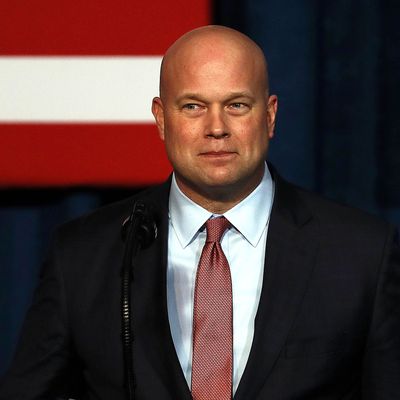
It is through his attorneys general that President Trump has always expressed his authoritarian vision in its purest form. He first appointed Jeff Sessions solely because, Trump said, he believed Sessions was “loyal.” Trump never forgave Sessions for the crime of following clear ethical rules requiring his recusal from the Russia investigation. (Trump’s model for a proper attorney general is one who “protected the president” even in the face of real crimes, as he claimed Barack Obama’s had done.) After firing Sessions for failing to violate ethical guidelines, he replaced him with the pliant hack Matthew Whitaker, who was so transparently unqualified and legally compromised that even the Republican Senate couldn’t confirm him. He finally settled on the equally pliant but confirmable William Barr.
But it is Whitaker who has coined the credo of Trump’s presidency. Dismissing the impeachment proceedings, he told Fox News host Laura Ingraham, “Abuse of power is not a crime.”
Whitaker’s point is that the House indictment of Trump does not accuse him of violating the law. He is not being impeached for tax evasion, violating campaign-finance regulations, or any other criminal statute you or I could be hauled into federal court for violating.
Whitaker draws on his experience as a prosecutor — a job he got as a loyal Republican operator, and then leveraged into a stint as a low-rent scammer — to argue that impeachment is exactly like a violation of criminal law. “I’m a former prosecutor and what I know is this is a perfect time for a preliminary hearing, where you would say, ‘Show us your evidence. What evidence of a crime do you have?,’” he says, “I mean, the Constitution, you know, sort of — abuse of power is not a crime. Let’s fundamentally boil it down to — you know, the Constitution is very clear that this has to be some pretty egregious behavior, and they cannot tell the American people what this case is even about.”
In fact, the Constitution does not say that narrowly defined criminal law violations are the sole basis for impeachment. The Framers considered a wide array of misdeeds, and historically, “the one common denominator” in impeachment proceedings has been the charge “that the official had somehow abused the power of his office and was unfit to serve.” Abuse of power was in particular the central theme of the articles of impeachment against Richard Nixon.
The absurdities that Whitaker’s standard would allow are easy to imagine. For one thing, actually charging any president with a traditional crime, especially this one, is prohibitively difficult. Trump’s lawyers have argued Congress has no right to investigate illegal acts he may have committed. Today, Trump’s Trump’s attorney told a federal judge that Trump could not be prosecuted even if he shot a person on 5th Avenue.
To be sure, most crimes are harder to prosecute than the ones that occur in dense urban regions teeming with witnesses. Yet Trump has issued a blanket stonewall of all congressional investigations, refusing to testify or hand over documents it is legally compelled to share with investigators. It would be impossible for any prosecutor to prove a crime by somebody who can withhold all evidence and testimony by his accomplices, let alone pardon them.
The president has vast powers, and in many cases is completely exempt from the laws that bind other government officials, which is why Trump can do things like hand classified intelligence to the Russians and collect payments from interested parties, which would get any other federal official charged with crimes. A president can legally order his subordinates to violate the law and promise them pardons (which Trump has also done). The possibilities for legal abuse of power are vast, and impeachment is the sole avenue of legal accountability.
As the factual defense of Trump’s behavior in the Ukraine scandal has disintegrated, Trump has slowly fallen back to the case he truly believes in his heart. Sessions was too naïve, and Barr too sophisticated, to present Trump’s worldview in such bald terms. It fell to Whitaker to articulate the ethos of the 45th president — that he is entitled to abuse power as he sees fit.
This column has been updated.






























